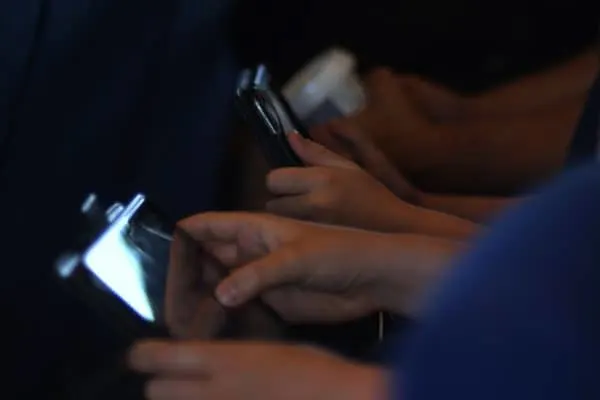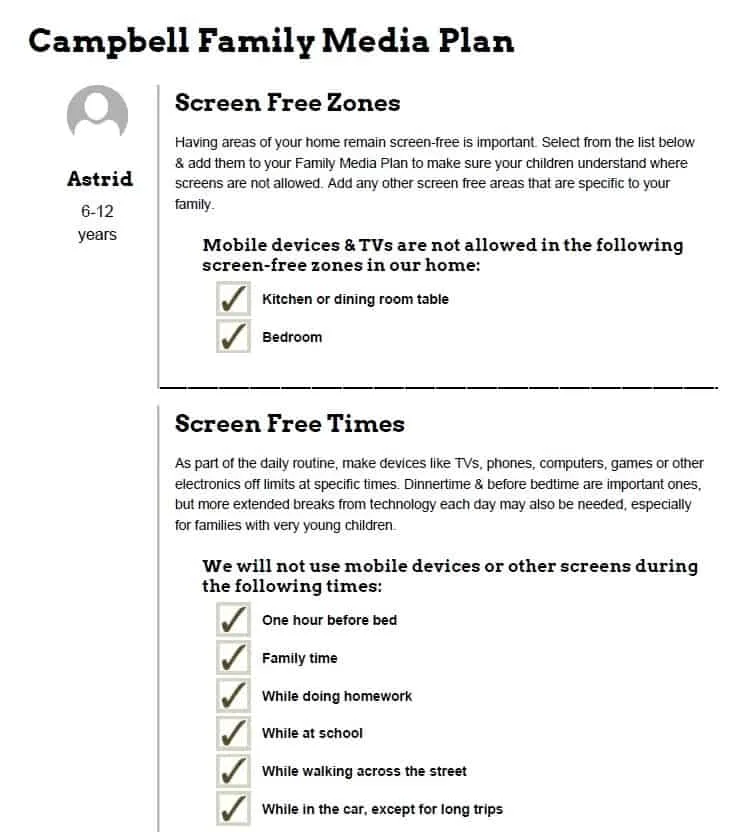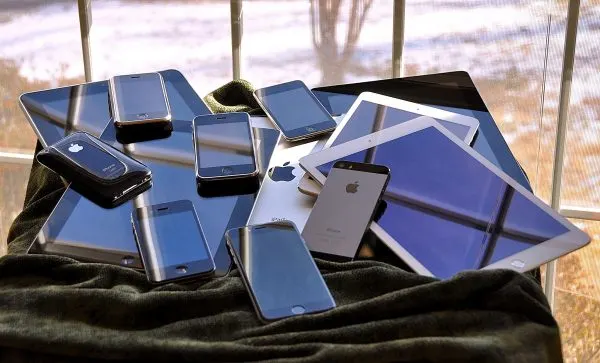Let’s face it, our kids can’t live without their phones & tablets. But as a parent, I’ve wondered why should parents limit screen time and what are the benefits of limiting screen time?
The benefits of limiting screen time include helping kids be more physically active, reducing developmental & behavioral issues like ADHD, helping kids connect more with others and be more present to the world around them.
If you are a parent, you have doubtlessly questioned the benefits of limiting screen time. If you haven’t, it’s a question worth asking.
In this post, we’re diving in deep into the screens that seem to dominate kids’ lives today. We’ll look at what the experts say and examine the real dangers of too much screen time.
We’ll also hear from experts who advocate for screen time.
Specifically, though, we’ll examine the top benefits of limiting screen time and how to implement them in your family.

Why do some parents allow unlimited screen time?
Screen time has become part of our everyday culture.
People feel weird if they forget their phone at home. They forget that for decades, people operated just fine without the power of NASA circa the 1960s in their back pocket.
But I get it. We come home after a long day of work. Then we have to make sure dinner is on the table. Make sure the kids did their homework and pick up around the house.
Giving them unlimited screen time gives parents a much-needed break.
It allows us to do stuff because our kids are occupied. Let’s also face facts. We, as people, are far busier than our grandparents were.
Today, in many households, we see (compared to previous generations):
- Longer commutes to work
- Households where both parents work
- More households where 1 or more parents work a side-hustle or 2nd job
All of that adds up to less free time, less time around the house, more stress, and less energy. So letting the kids veg out for hours on a screen keeps some parents from falling apart.
But in the back of our minds, we know there are benefits of limiting screen time.
Should I limit my child’s screen time?
Yes, is the short answer.
For starters, screens make our kids sedentary. In other words, they stay glued to the couch or bed instead of playing, interacting with others, and being physically active.
Then for another, unless you are closely monitoring them, you don’t really know what they are watching. My oldest daughter, almost 13 as of this writing, just saw one of her classmates on TikTok smoking and drinking White Claw (an alcoholic product).
My middle daughter (11 and a half) had a friend of hers who lost her phone indefinitely because a friend had sent her pictures of marijuana leaves. So your kids could easily be seeing things that are just not age-appropriate (and you might never know).
But we do know screen time provides the following:
- Entertainment
- Distraction
- Information
- Education
- A built-in babysitter
So pluses and minuses to be sure.
Like anything else in life, there has to be balance. So don’t let your kids have unlimited screen time. They need to interact with others in the real world; to get their hands dirty.
Movement is also incredibly important for health. Sitting for long periods of time (which they do all day at school too) is not good for our overall health and well-being.
Think screen time in your house is out of control?
I have a previous post about Cell Phone Addiction Symptoms (click to read it on my site). It’s well worth checking out if you haven’t already. After all, if we have an issue with technology addiction, we can’t very well curb our children’s addiction to their screens.
How much screen time does the average kid spend a day?

The sad truth is, according to a study published by the American Heart Association, kids ages 8 to 18 are spending upwards of 7 hours a day on a screen.
Of course, some of that is at school, but it’s still WAY out of control.
Their study was designed to look at the impact of screens and kids being less physically active than previous generations and how that affects childhood obesity and heart issues.
They go on to suggest limiting screen time to no more than 2 hours a day. For kids aged 2 to 5, they recommend no more than 1 hour.
In our house, we are stricter still as my oldest tween daughters just get 1 hour a day (on school days) and a little bit more on weekends.
How long should a child look at a screen?
Aside from keeping kids less physically active, there are also concerns about the actual light emitted from the screen itself and how that affects children (and adults).
So even if you set limits on screen time (and you should), it’s good to break that up into chunks.
In our house, our older tween girls get a little tech time while I fix their breakfasts and my wife gets their lunches ready (maybe 20 minutes max).
They get a little bit more when they first get home from school before doing homework, and then, if they haven’t hit their limit of 1 hour/day, they get a bit more before dinner and the bedtime routine.
Breaking it up into chunks gets them moving a bit in between screen time.
It also gets their minds thinking about different things and, most importantly, gets them interacting with other people instead of being completely engrossed in an online world.
We know Technology Affects the Brain Negatively (click to read how on my site).
Not convinced? Check out my highly shared post that dives deep into the research that shows exactly what too much screen time does to our brains
Why is too much screen time bad for you?
A recent study published by John Wiley & Sons concluded that “Children who started watching television at 12 months of age and watched television 2 hours/day were approximately six times more likely to have language delays.”
The American Academy of Pediatrics recently revised its recommendations on the benefits of limiting screen time to reflect that:
- “For children ages 2 to 5 years, limit screen use to 1 hour per day of high-quality programs”
- “watching TV for more than 1.5 hours daily was a risk factor for obesity”
- “those with higher social media use or who sleep with mobile devices in their rooms were at greater risk of sleep disturbances”
- “Media use around or after bedtime can disrupt sleep and negatively affect school performance.”
In short, they recommend “Families should proactively think about their children’s media use and talk with children about it, because too much media use can mean that children don’t have enough time during the day to play, study, talk, or sleep,”
They have, however, recently dropped their recommendation that children 6 and up be limited to 2 hours per day of screen time.
Instead, they insert a somewhat vague statement that says “place consistent limits on the time spent using media, and the types of media, and make sure media does not take the place of adequate sleep, physical activity and other behaviors essential to health. ”
How much screen time should a 2-year-old have?
Up to 18 months, the American Academy of Pediatrics recommends NO screen time, at least in terms of phones and tablets.
They go on to say “Some media can have educational value for children starting at around 18 months of age, but it’s critically important that this be high-quality programming, such as the content offered by Sesame Workshop and PBS.”
By age 2, just a few months later, you can begin to introduce a very small amount of screen time if you wish. In my house, however, it will likely be age 4 before our youngest daughter gets a shot at any handheld screen.
The other benefit of getting our younger kids off screens is that they can learn How to Play Independently (click to read on my site) without just zoning out in front of a screen.
That helps with cognitive development in addition to the benefits of getting them physically moving.
How do I reduce my toddler’s screen time?

The American Academy of Pediatrics goes on to strongly suggests families with young kids come up with a Family Media Plan.
“By creating a Personalized Family Media Use Plan, you can be aware of when you are using media to achieve your purpose. This requires parents & users to think about what they want those purposes to be.”
Having just completed their media plan for my kids, I can attest that essentially this creates a written plan (which can be printed, shared or socially posted) that outlines:
- When and where screen time is appropriate
- Rules to follow for downloading new games or apps
- How much screen time is OK
- Limits for screen time as it pertains to bedtime, dinner time, etc
They also strongly suggest that electronic devices not be used in the bedrooms. In addition, they suggest having a dedicated spot in the house for devices to charge and remain overnight.
Here’s a quick glimpse of page 1 of the Family Media Plan I just did for my oldest daughter Astrid:

Need more detail on the media plan?
Did Steve Jobs limit screen time?
He did!
The guy who practically invented personal computers, cell phones, and tablets did indeed have strict screen time limits in his house.
When the iPad was first released, Jobs was asked how much his kids loved it.
His response? “They haven’t used it”.
He went on to say “We limit how much technology our kids use at home.” See more on that story in this great piece by the New York Times.
And Jobs isn’t the only tech guru to do that!
In 2007, Bill Gates, former CEO of Microsoft, started capping his daughter’s screen time when he noticed her becoming obsessed with a video game.
Gates also didn’t let any of his kids get a cell phone until they turned age 14.
Why #SteveJobs Didn’t Let His #Kids use an #ipdad https://t.co/PenD532VTJ #childdevelopment #parents
— T.R. Thibodeau (@lavishventures) September 20, 2018
Does too much screen time really cause ADHD?
In short, according to some experts, yes.
In a recent study done at the Department of Pediatrics at the University of Alberta in Edmonton, Alberta, Canada, they found that “Children with more than 2-hours of screen-time/day had a 7·7-fold increased risk of meeting criteria for ADHD”.
That study goes on to conclude that “Screen-time above the two-hours threshold at 5-years was associated with an increased risk of clinically relevant externalizing morbidity and specifically inattention problems.”
I have an earlier article that addresses the ADD & ADHD issue and another study.
That study finds that playtime away from things like electronic devices can actually improve the symptoms of those conditions.
If your child is suffering from ADHD, I highly recommend you take a moment and review some of the best ways of Treating ADHD Naturally (click to read on my site).
I know it is a potentially a contentious statement to imply that too much screen time could possibly cause ADHD.
And I’m not here to call anyone a bad parent because they make different choices than I do. I’m also not saying that if your child has ADHD that it’s tied to the choices you made as parents.
I am here to say I don’t have all the answers but I’m not afraid to ask questions.
We all make mistakes and we learn as we go and what works for one family may not work for another. So fear not; we’re in this together and we can all learn from each other.
Do all experts agree on limiting screen time?
No, is the short answer. In fact, some experts and educators do think there are no reason to set limits for kids on screentime.
New study finds screen time for kids not that bad https://t.co/GFGKT8AU3P pic.twitter.com/WnR8d0BKuz
— Ernie Delgado (@BEYONDTeched) February 9, 2017
Professor Christopher Ferguson of Stetson University has published a few related studies on this subject and some adjacent topics.
He claims to have found, among other things, that there is only a minimal association between excessive screen time and rates of childhood depression. He also has studies where he claims finding that show no correlation between video games and violent behavior.
My jury is still out on his point of view, although to be sure, violent video games alone do not a serial killer make.
To sum up, I think the benefits of limiting screen time can be a complicated issue!
I think it’s an issue almost every parent faces. And I think the issues created by a lack of screen time limits probably manifest themselves differently in different households.
Thus there may not be 1 right answer.
So what are we, as parents, supposed to do?
As with all of parenting, we know we are going to make mistakes. We know that even if we try our best, we will still make a call we later regret.
All we can do is remember to breathe, be kind to ourselves & own our mistakes to our kids.
If you see a behavior manifesting; talk about it. If you think screen time is an issue you haven’t properly addressed before; address it now! The benefits of limiting screen time are proven. Don’t be afraid to be that weird parent that doesn’t let their 9-year-old have a $600 smartphone and a Facebook account!
All we can do is our best.
If you are there for your kids, provide love, care, knowledge, shelter, and food you are covering all the essentials. Just be real. Be honest. Care. Connect. Be Present.
So what are my . . .
13 Suggestions on the Benefits of Limiting Screen Time?

- No screens at the dinner table (home or out)
- No screens in the car (unless you’re on a long trip)
- Have a screen-free day (watching a family movie together being a good exception) – we do this on Sundays
- No screens within an hour of bedtime
- Make sure what they are doing is age-appropriate!
- Make sure that screen time is not happening at the expense of homework or physical activity
- It’s perfectly OK to take away screen time when other more important things are not being done or done well
- A little time in the morning before school while you make breakfast is OK
- 30 minutes after school before homework and dinner is good too
- Be a little laxer on Saturday (or 1 day of your choice)
- Make sure both parents are on the same page!
- Make sure you aren’t asking your kids to do things you aren’t willing to do! They can smell a hypocrite a mile away!
- Check in with your kids – It may not interest you at all, but take an interest in what games and websites your kids are going to. After all, you’re showing interest in your kids, not the website or game.
Final Thoughts
In this post, we took an in-depth look into what many consider a big problem with today’s generation.
I’m talking about screens and the potential damage they can do when our kids spend too much time on them. We heard from experts on both sides. Then we looked at the hard, cold facts.
Specifically, though, we looked at the top benefits of limiting screen time so you can make the best decision for your family.
Do you let your kids have screens at the dinner table?
Photo credits (that aren’t mine):
Hands holding phones – https://www.flickr.com/photos/blondinrikard/
Kids on Ipad – https://www.flickr.com/photos/lens-cap/
Baby on Laptop – https://www.flickr.com/photos/speculummundi/
Pile of devices – https://www.flickr.com/photos/blakespot/
- Impact of Emotionally Absent Fathers on Daughters - April 30, 2024
- Sagittarius Man & Gemini Woman Love and Sex Compatibility - January 31, 2024
- Taurus Ascendant Rising Personality Traits in Men (Guide) - January 31, 2024
